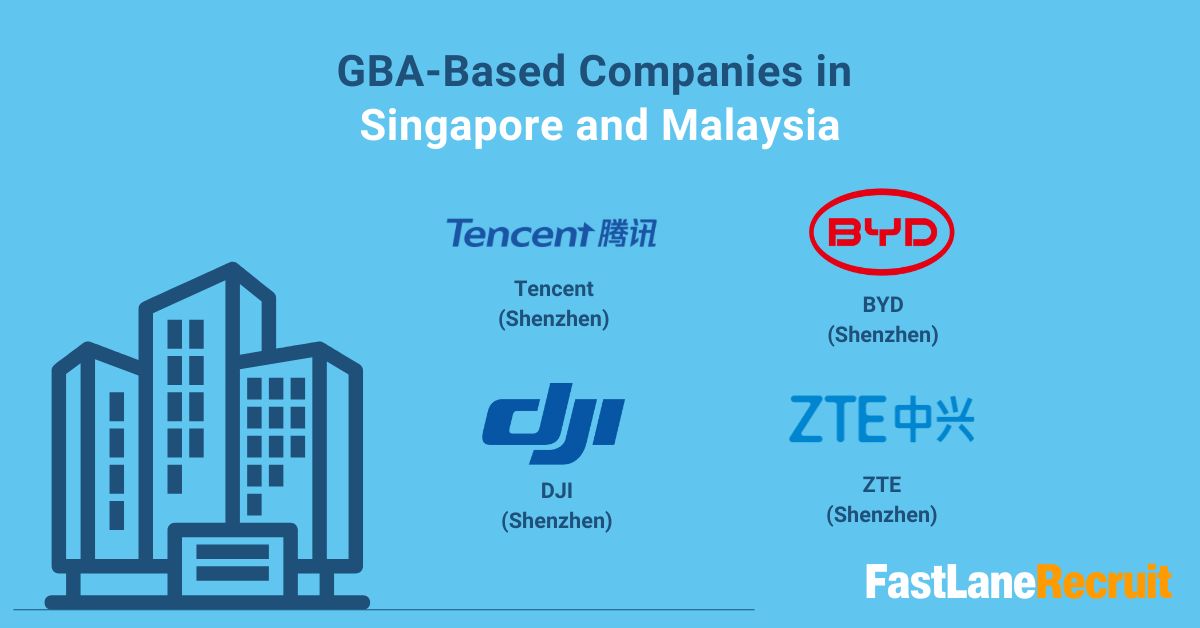Introduction
The Rise of Tech Innovation in Southeast Asia
Southeast Asia is an emerging spot for tech innovation and Singapore and Malaysia are leading the trend. Both countries have established a strong foundation for tech startups through government support, digital infrastructure and access to the growing ASEAN market.
The Greater Bay Area (GBA): A Launchpad for Global Expansion
The Greater Bay Area (GBA), comprising Hong Kong, Shenzhen, Macao and Guangdong Province is one of the world’s most exciting tech hubs. With strengths in smart manufacturing, fintech, e-commerce and AI, the GBA provides startups a solid base to explore new opportunities in Southeast Asia. Expanding to Singapore and Malaysia allows GBA startups to tap into ASEAN’s 600 million market and go global.
In this article, we will explain how Singapore and Malaysia support tech startups with government incentives, startup resources and networking opportunities to scale.
Content Outline
Key Summary
Government Incentives
Both Singapore and Malaysia offer grants, subsidies, and tax exemptions to tech startups, fostering growth and innovation.
Strategic Connectivity
Singapore provides access to ASEAN markets via trade agreements, while Malaysia offers cost-effective operations and R&D.
Startup Resources
World-class incubators, accelerators, and co-working spaces in both countries help startups scale efficiently.
Success Stories
GBA tech giants like Tencent, BYD, and DJI have leveraged Singapore and Malaysia to expand across Southeast Asia.
Balanced Strategy
Singapore’s innovation and Malaysia’s affordability create a winning combination for tech startup expansion.
Government Support and Incentives
1. Grants and Subsidies for Tech Startups
Government-backed funding programs and tax incentives play a vital role in helping startups grow efficiently:
Singapore
- Startup SG Program: Gives financial support and guidance to new technology-based businesses to create new technologies.
- Enterprise Development Grant (EDG): On average, funds up to 70% of the costs of projects related to expansion of the market, innovation, and increase in productivity.
- Pioneer Certificate Incentive: Tax exemptions for companies engaged in innovation industries and hi-tech R&D programs.
Malaysia
- MSC Malaysia Status: Technology industries are privileged to enjoy tax holidays and incentives, infrastructure facilities, and incentives for research and development and innovation grants.
- Cradle Fund: Finances Malaysian startups in pre-seed and seed stages to support their rapid growth.
- Digital Economy Blueprint: It’s a nationwide campaign aimed at the digitalization and advancement of the technology industry.
Key Takeaway: Government incentives can be utilized as a cost-cutting measure, force multiplier and primary source of funding for startups.
2. Supportive Trade Policies and Tech Ecosystems
Singapore: A Regional Trade Powerhouse
- Free Trade Agreements (FTAs): Currently, Singapore has over 26 of the international FTAs; businesses enjoy a smooth connection to global markets.
- Innovation-Driven Policies: Platforms, such as Smart Nation Singapore, help to attract investment into such sectors as AI, IoT, and fintech and ensure a healthy environment for technology development.
Malaysia: Rising as a Digital Economy Leader
- Regional Connectivity: As a member of RCEP (Regional Comprehensive Economic Partnership), Malaysia can expand its way to cross-border entry into international markets.
- Tech Hubs: Some places like Cyberjaya and Penang act as hubs of technology, digitalization, smart industries, logistics, and many others.
Pro Tip: Startups can leverage Singapore’s access to regional markets while simultaneously Singapore and Malaysia’s cost-efficient tech environment for business and talent.
Startup Resources
1. Incubators, Accelerators, and Innovation Hubs
Tech startups can benefit from world-class incubators, accelerators, and innovation hubs designed to provide funding, mentorship, and collaboration:
Singapore
- SGInnovate: Centred on financing and providing mentorship to deep-tech founders at an early stage.
- BLOCK71: A global network of incubators, that help startups access funding, knowledge base, and potential partners.
- NUS Enterprise: Delivers courses, capital and support services to begin-up technology and innovation companies.
Malaysia
- MaGIC (Malaysian Global Innovation & Creativity Centre): Provides planned services for companies in need of assistance based on the developing phase.
- Cyberview Living Lab: Incubator created to spur technological advancements in developing smart cities, Artificial Intelligence or artificial intelligence, and logistics solutions.
- Penang Digital Hub: An open platform for technology companies to innovate, sell online and produce.
Key Insight: Innovation hubs in Singapore and Malaysia offer startups tailored resources and infrastructure to accelerate growth and collaboration.
2. Co-Working Spaces and Collaboration Environments
Flexible workspaces have become a popular choice for startups to reduce overhead costs and foster innovation:
Singapore
- The Great Room: Co-working spaces for tech startups and innovators.
- JustCo and WeWork: Flexible offices with modern amenities and connections.
Malaysia
- Common Ground: Co-working spaces for collaboration and team productivity.
- WORQ: Office setups in KL, JB and Penang for startups.
Action Tip: Use Singapore for networking and investor meetups, and Malaysia for R&D and team scaling.
Success Stories: GBA-Based Companies in Singapore and Malaysia

1. Tencent (Shenzhen) – Expanding to Singapore
Tencent, one of China’s biggest tech companies, set up its regional headquarters in Singapore to expand its fintech and digital services across Southeast Asia.
- Why Singapore? Business-friendly regulations, advanced financial infrastructure and connectivity to ASEAN markets.
- Impact: Tencent used Singapore as a launchpad for its WeChat Pay services and gained a strong presence in the region’s fintech space.
2. BYD (Shenzhen) – Establishing in Malaysia
BYD, a Shenzhen-based EV manufacturer, entered Malaysia to leverage its location and green tech incentives.
- Why Malaysia? Good logistics, tax incentives and support for clean energy.
- Impact: BYD reduced costs and strengthened its distribution network for EV products across ASEAN.
3. DJI (Shenzhen) – Growing in Southeast Asia
DJI, the world’s leading drone technology company, has a presence in both Singapore and Malaysia:
- Singapore: Regional R&D and distribution centre for ASEAN.
- Malaysia: Cost-effective assembly and logistics support.
- Impact: DJI brought its drone solutions to commercial and industrial markets in Southeast Asia.
4. ZTE (Shenzhen) – 5G Expansion in Malaysia
ZTE, a leading player in telecommunications and 5G, partnered with Malaysian telcos to roll out 5G in the country.
- Impact: ZTE accelerated Malaysia’s 5G adoption.
Why Singapore and Malaysia Make Sense for GBA Tech Startups
Singapore: Innovation and Global Connectivity
- A global innovation hub with access to investors, mentors and infrastructure.
- Location for regional HQ and scaling across ASEAN markets.
Malaysia: Cost-Effective Operations and Talent
- R&D, ops and tech development at affordable costs.
- Government support for startups and growing talent pool.
Key point: Singapore’s innovation hub + Malaysia’s cost structure = balanced expansion strategy for GBA startups.
Conclusion
Unlock Your Growth Potential
Singapore and Malaysia offer complementary advantages that empower tech startups from the Greater Bay Area to expand and thrive:
- Singapore: A global hub for tech leadership, investor engagement, and market access.
- Malaysia: A cost-effective centre for technical operations, R&D, and team scaling.
Take the Next Step with FastLaneRecruit
At FastLaneRecruit, we help tech startups seamlessly enter Southeast Asia through:
- Outsourcing Solutions: Finding the right talent for your startup.
- Employer of Record (EOR) Services: Ensuring legal compliance and quick market entry.
- Payroll Management: Streamlined workforce administration for your operations.
Ready to Expand? Contact FastLaneRecruit today and leverage the opportunities that Singapore and Malaysia offer to take your tech startup to the next level!


